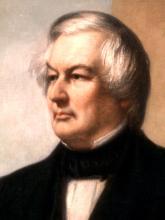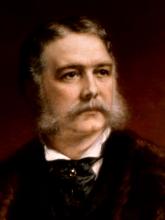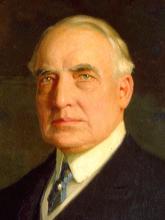inspiration + perspiration = invention :: T. Edison ::
Today is President's Day, and we're all set to hear a lot about the usual suspects: the perfect George Washington, the stately Abraham Lincoln, the tragic John F. Kennedy. But there have been 43 presidents since Washington first took his oath of office. Unless that person happened to serve during a war or do something really amazing or stupid, many of these men have been lost to the cobwebs of history.
Here are three presidents you've likely forgotten, or never heard of in the first place.
#13: Millard Fillmore
 Fillmore had the unfortunate luck to come after all the initial founding fathers served and too early to be associated with the Civil War. He's not unknown for wont of work. Prior to going to the White House this New York native served in his state's assembly, Congress (four terms), and then as Vice President under war hero Zachary Taylor. When President Taylor died in office of natural causes in 1848, Fillmore stepped into the Oval Office.
Fillmore had the unfortunate luck to come after all the initial founding fathers served and too early to be associated with the Civil War. He's not unknown for wont of work. Prior to going to the White House this New York native served in his state's assembly, Congress (four terms), and then as Vice President under war hero Zachary Taylor. When President Taylor died in office of natural causes in 1848, Fillmore stepped into the Oval Office.
What did Fillmore accomplish during his three years as POTUS? Despite not being remembered for it, he signed the bill that included the Fugitive Slave Act. It was a compromise that included a provision to abolish slavery in District of Columbia in an attempt to stave off war. His term was peaceful: he even prevented a hostile takeover of Cuba and settled the remains of the Mexcian-American War with Texas.
He had the foresight to send Commodore Perry to Japan for trade. His wife established the House library. He also met Queen Victoria and was deemed "the handsomest man she had ever met." He bares the distinction of being the last President not to identify either as a Democrat or Republican, and even his own party wasn't overly fond of him since they didn't nominate him after he finished out his term.
Noteable quote: "I had not the advantage of a classical education, and no man should, in my judgement, accept a degree that he cannot read," in response to being offered an honorary degree from Oxford.
Millard Fillmore has inspired the name for a few towns and parks, a comic strip character, and an active Twitter handle.
#21: Chester A. Arthur
 Arthur wasn't high enough in rank during the Civil War to gain renown, and fell behind his predecessor's Garfield in notoriety by not having a cartoon cat named for him. But when that President was assasinated in 1881, only 200 days after his inauguration, it remained for his Vice President Arthur to lead the country.
Arthur wasn't high enough in rank during the Civil War to gain renown, and fell behind his predecessor's Garfield in notoriety by not having a cartoon cat named for him. But when that President was assasinated in 1881, only 200 days after his inauguration, it remained for his Vice President Arthur to lead the country.
Previously to becoming POTUS Arthur served as a school principal and lawyer in Vermont, gained the rank of brigadier general in the military, collected customs in New York's port, and then eventually Vice President.
What did he accomplish? He actually signed several important pieces of legislation: the Chinese Exclusion Act (a 20 year ban against Chinese immigration that Arthur negotiated down to 10 years) and the Pendleton Act, reforming the civil service by putting examinations in place for federal jobs. He also had an unusual problem: the federal government was apparently "embarrassed by annual surpluses of revenue," prompting him to promote lower tariffs, angering nearly everyone (at least that much hasn't changed).
He also invested in steam-powered engines and steel cladding for naval ships. But he didn't just want to make the Navy look better. He improved the White House with a remodeling, dedicated the Washington Monument, and was known himself as "Gentleman Boss" and "Elegant Arthur" due to his stylish duds (reportedly including 80 pairs of pants).
Noteable quote: "I may be president of the United States, but my private life is nobody's damned business," in reply to a White House visitor's question.
Other than a monument in New York City's Madison Square and a few stray fictional references, Arthur has otherwise escaped any notice good or bad in later generations. Good thing he was so well liked during his own time.
#29: Warren G. Harding
 Bookended by wartime Wilson and Silent Cal, Harding has slipped through the cracks of '20s nostalgia. He didn't even have popularity during his own time, though he did get elected in his own right to the office after a diverse career as a teacher, insurer, newspaper editor, State Senator and Lieutenant Governor, and US Senator.
Bookended by wartime Wilson and Silent Cal, Harding has slipped through the cracks of '20s nostalgia. He didn't even have popularity during his own time, though he did get elected in his own right to the office after a diverse career as a teacher, insurer, newspaper editor, State Senator and Lieutenant Governor, and US Senator.
Harding's tenure as president doesn't have many saving graces. He refused to enter the League of Nations after his predecessor's tireless work establishing that organization, and his Secretary of Interior sold oil reserves for personal profit in the infamous Teapot Dome Scandal. His personal life weren't much better: his friends often took advantage of his trust to defraud the government, and he was widely known to be involved in extramarital affairs.
Despite his defects, he achieved some significant milestones for the presidency. His wife was the first First Lady to vote for her husband and actually campaigned on his behalf. He embraced technology, riding to his own inauguration in an automobile and installing a radio in the White House. His visits to Alaska and Canada were novel. Despite his probusiness and conservative bent, he actually signed the first welfare act for public health of mothers and children, advocated an anti-lynching bill, and his cabinet worked to reduce German war debt through the Dawes plan. He died only two years into his term, so here's hoping he might have made picked up a second wind if given the time
Noteable quote: "I don't know what to do or where to turn in this taxation matter," made to White House aid Judson Welliver. Last year he became known for more racy speech due to the publication of letters written to his lovers.
This president actually appeared in a 1920 silent film; since then he's made appearances in a few television dramas (including Boardwalk Empire), a musical, play, and novel. His biggest claim to fame today (besides his illicit correspondence) lies in two railroad cars: the one he toured Alaska in, on display at Pioneer Park in Fairbanks, and the one his body returned home in after his death, preserved at the Southeastern Railway Museum.





